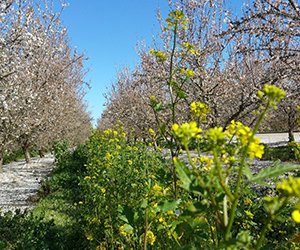(May 1, 2020) - Are you looking for better integrated pest management practices to implement in your orchard? Have you had a successful cover crop experience and want to take your cover crop game to the next level? Are you aiming for more efficient irrigation, but need a little financial assistance to get there?
 Almond growers who implemented orchard management efforts in the past, such as planting cover crops, have a competitive edge in the NRCS CSP application process.
Almond growers who implemented orchard management efforts in the past, such as planting cover crops, have a competitive edge in the NRCS CSP application process.
If one of these instances describes you, you may be eligible for funding through USDA’s Natural Resources Conservation Service (NRCS) Conservation Stewardship Program (CSP). Similar to NRCS's EQIP program, the CSP application is open year-round. However, there are periodic deadlines for funding reviews, with the next deadline being June 5. Growers are encouraged to apply early to their local NRCS office for consideration and to have the best change at receiving funding for the 2020 crop year.
Production practices covered through this program change year to year, so growers should review CSP's list of what are called "enhancements" for the FY 2020 to determine what may be covered. This year, CSP is funding many management efforts related to the almond industry that will also help the California almond community move the needle toward achieving its Almond Orchard 2025 Goals. Examples of these practices include planting cover crops, mulching removed orchards, implementing environmentally friendly pest management practices, improving irrigation management techniques and using precision nutrient application.
In addition to owners, operators may also apply for NRCS programs, CSP included. Successful applicants may be awarded a five-year contract, typically with an option to renew for a second five-year term.
“This program can help the industry move closer to achieving the 2025 Goals, and is particularly useful for growers who are already implementing new, sustainable practices, as recommended by the Almond Board,” said Jesse Roseman, principal analyst, Environmental and Regulatory Affairs, Almond Board of California.
CSP was reauthorized (received funding) via the 2018 Farm Bill. It is an ideal program for growers who have a record of implementing innovative management practices to improve their orchards and farm responsibly. That track record, including participation in other NRCS programs, gives growers a competitive edge in the application process. Example of practices for which growers may receive funding include:
Interested in learning more? Visit your local USDA service center or visit www.nrcs.usda.gov/GetStarted.
For more information on almond-specific conservation practices and to sign up for CASP, visit SustainableAlmondGrowing.org.